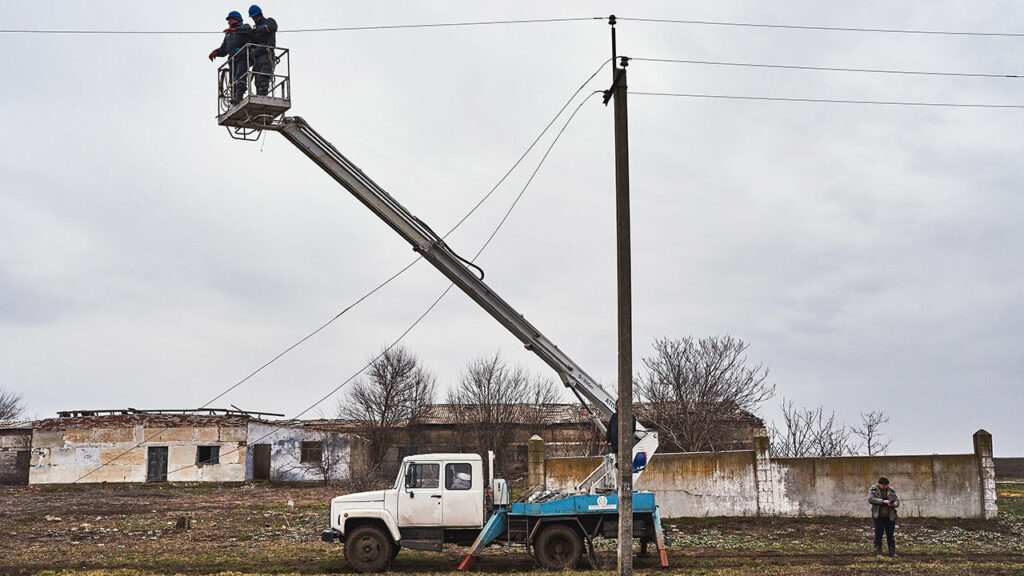Every business in Ukraine has an essential reference point that guides its resilience and operation amid chaos and adversity. For Mykhailo Travetsky, a farmer based in Pryluky, this moment of reckoning came during the initial six weeks of the intense invasion. As Russian military columns ground to a halt on a roadway close to his farm, the landscape transformed into a chaotic expanse of conflict. The area around his farm became a bastion of resistance, as proud locals banded together, engaged in fierce battles to repel the advancing forces of Russia. Desperate to protect their home and livelihood, they fought valiantly amid a storm of gunfire and artillery.
The dire conditions did not deter Mr. Travetsky from his daily responsibilities. In a remarkable display of courage and determination, he continued to care for his livestock, milking his cows twice a day despite the extraordinary threat that loomed just outside his barn. Adorned in body armor, he braced himself against the onslaught of violence, with an automatic rifle firmly positioned at his side, forever vigilant. This lifestyle, of living and working in a war zone, illustrates not just the tenacity of an individual but the collective spirit of Ukrainian farmers who refuse to abandon their agricultural commitments amid profound adversity.
In Pryluky, where Mr. Travetsky operates, the clash between survival and everyday business operations has become increasingly tenuous. The farm, once a symbol of prosperity and food security, morphed into a scene of harrowing conflict and uncertainty, where each milking session carried the weight of potential loss and grave danger. The psychological impact of such an environment is immeasurable; the threat of violence disrupts not only the physical act of farming but also instills a sense of dread in the day-to-day tasks that were once intuitively simple.
Moreover, Mr. Travetsky’s experience may resonate with a multitude of similar narratives echoing across the war-torn regions of Ukraine. As farmers, traders, and entrepreneurs navigate the treacherous waters of conflict, they embody a resilience that belies the chaos surrounding them. Such stories illustrate the human capacity for endurance, as individuals cling to their identities and professions in the aftermath of upheaval and loss. Each farmer’s struggle is also a testament to the importance of agriculture as a cornerstone of Ukrainian society, vital not only for local sustenance but also for the country’s economy and international relations.
Yet, the situation remains precarious, as external factors continually threaten the stability of agricultural practices. Supply chains have been disrupted, and essential resources have suffered from both their physical insecurity and market volatility. Crop yields are uncertain, and livestock care becomes an added challenge amidst continuous anxieties surrounding safety and security. Farmers like Mr. Travetsky are left grappling with these dynamics while attempting to sustain their businesses.
This intricate interplay between daily agricultural responsibilities and the overarching threat of war has forced many to innovate in their operations. Strategies to safeguard livelihoods have emerged, varying from forming local coalitions for mutual protection to seeking alternative markets or resources to dodge the crippling effects of war. Despite the vast array of adversities, the unwavering resolve manifests not only in physical acts of bravery but also in creative problem-solving.
Overall, the experience of Mykhailo Travetsky in Pryluky encapsulates the dual nature of existence during wartime—a life filled with both profound trepidation and remarkable resilience. His farm, a microcosm of the broader Ukrainian agricultural landscape, is a reminder of the lengths to which individuals will go to protect their way of life, uphold their business commitments, and serve their community amidst despair. As the conflict continues to unfold, the stories of such individuals become increasingly important, illuminating the enduring human spirit amid the darkest of times.









